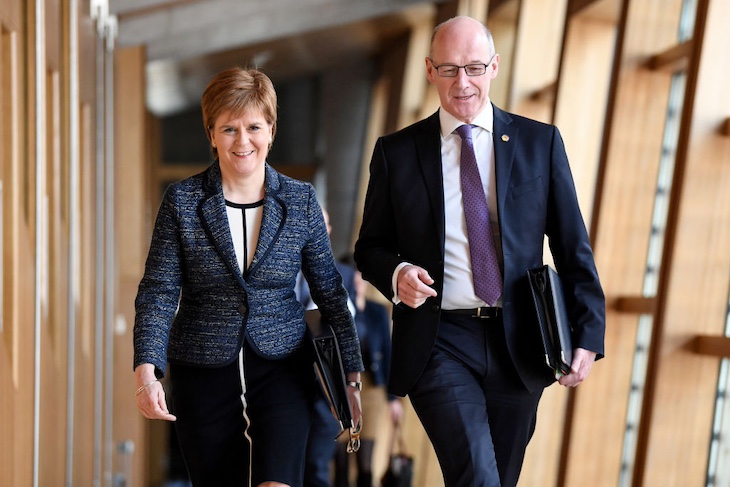The last time John Swinney was leader of the SNP, 20 years ago, the party went on to return only six MPs in the next general election. Labour returned 41 north of the border. Swinney had resigned the year before, but this was his electoral legacy.
The party has had a traumatic year since the precipitate departure of Nicola Sturgeon
Could history be about to repeat itself now he is leader once again? The most recent YouGov poll, conducted after Swinney became leader and First Minister, suggests that Labour has a ten point lead over the SNP in Scotland. If that were maintained on polling day, the nationalists would be reduced from 43 MPs to only 11. Scottish Labour would win 35 seats – which could mean the difference between Keir Starmer entering No. 10 with an overall majority and him being a minority prime minister.
Such a rout against the SNP is unlikely. But there is no disguising the anxiety in the SNP about this snap summer election, which John Swinney argued ‘disrespected Scotland’. It will fall during the Scottish school holidays which begin three weeks before England’s. This adds a new dimension of uncertainty since many Scottish voters will be away from home. Some will organise postal votes, and many disillusioned former SNP supporters may vote with their buckets and spades.
Swinney put a brave face on it all yesterday, pointing out that 4 July could be ‘independence day’, not just in America but closer to home. It’s safe to say that no one, even in the SNP, takes that seriously. Constitutional change is currently far down the priority list for Scottish voters, trailing the likes of the NHS, the economy, education and housing.
Moreover, the party is still recovering from the resignation of Humza Yousaf three weeks ago following the acrimonious split with the Scottish Greens. They were ousted from the coalition government in Holyrood and did not take it well. Patrick Harvie’s aggrieved activists will now be seeking to drain votes from the SNP, as will Alex Salmond’s Alba party. Neither are likely to return any MPs but their votes could count in marginal races.
The timing really could not be much worse for the new First Minister. The party has had a traumatic year since the precipitate departure of Nicola Sturgeon. Only last week, Swinney declared a housing emergency. This week his top civil servant has warned that deep cuts are needed in Scottish government spending to balance the books. The polls are dire, the party is split over Swinney’s appointment of the socially conservative MSP, Kate Forbes, as deputy first minister, and the SNP remains under the cloud of Operation Branchform, the long-running police investigation into irregularities in the party finances.
Last month, the former SNP chief executive, Peter Murrell, Ms Sturgeon’s husband, was charged with embezzlement. Another arrest during the campaign would be devastating. And the damage is not just to the party’s image of probity.
Since Sturgeon resigned in February last year, the party finances have also been wrecked. During Humza Yousaf’s reign there were no significant donations over £1,500 from living donors, only bequests from the deceased. SNP membership has been slashed since its glory days after 2015 which means fewer subscriptions. The party is overdrawn and will have to fight with a war chest of less than half the £500,000 that Scottish Labour has reportedly raised.
General elections aren’t just about money of course. Personalities and policies are more important factors. John Swinney is not exactly a charismatic figure and his safety-first policy agenda does not inspire confidence. He gave a preview of the SNP manifesto in his statement to parliament this week in which he outlined his ‘priorities for Scotland’. They are: eradicating child poverty, boosting economic growth, tackling the climate emergency and improving public services – in particular the NHS. Independence for Scotland was not one of them – though Swinney had said that it would be ‘page one, line one’ of the SNP general election manifesto.
But all talk about this election being a ‘de facto referendum on independence’, as Nicola Sturgeon proposed, has been quietly forgotten. After all, on present polling numbers the SNP could likely lose it by a larger margin than in 2014.
Any hope that an incoming Labour government might grant a repeat referendum has also evaporated. Keir Starmer is as adamant as the Tories that there will be no concessions to the SNP – no deals, no promises, no negotiations. He doesn’t want any repetition of those Tory election adverts showing Ed Miliband in the top pocket of Alex Salmond.
It is hard to believe that less than a decade ago, under Nicola Sturgeon’s leadership, the SNP won all but three of Scotland’s 59 seats. Even now the SNP remains the third largest party in Westminster with 43 MPs. The SNP may well return half that number in six weeks’ time according to the current run of opinion polls.
So this is an election pregnant with historic significance. This July will almost certainly mean the end of an era of nationalist dominance of Scottish politics – an era in which the integrity of the United Kingdom was seriously threatened by a nationalist insurgency. We may never see the like again.
This article is free to read
To unlock more articles, subscribe to get 3 months of unlimited access for just $5








Comments
Join the debate for just $5 for 3 months
Be part of the conversation with other Spectator readers by getting your first three months for $5.
UNLOCK ACCESS Just $5 for 3 monthsAlready a subscriber? Log in